PepsiCo Bribery Case: Ethical Implications in International Business
VerifiedAdded on 2020/05/08
|5
|1031
|111
Report
AI Summary
This report examines the ethical implications of a bribery case involving senior managers at PepsiCo. It explores the negative impact of unethical behavior, such as bribery, on a company's reputation, financial profitability, and organizational culture. The report discusses the implications of the managers' actions based on deontology and virtue ethics, highlighting the importance of ethical values and moral character in business. It recommends implementing a code of ethics, disciplinary actions, and compliance training to promote ethical behavior. The conclusion emphasizes the importance of addressing bribery concerns and fostering an overall ethical framework within the organization to ensure smooth business operations and maintain stakeholder trust. The report utilizes references to support its claims.
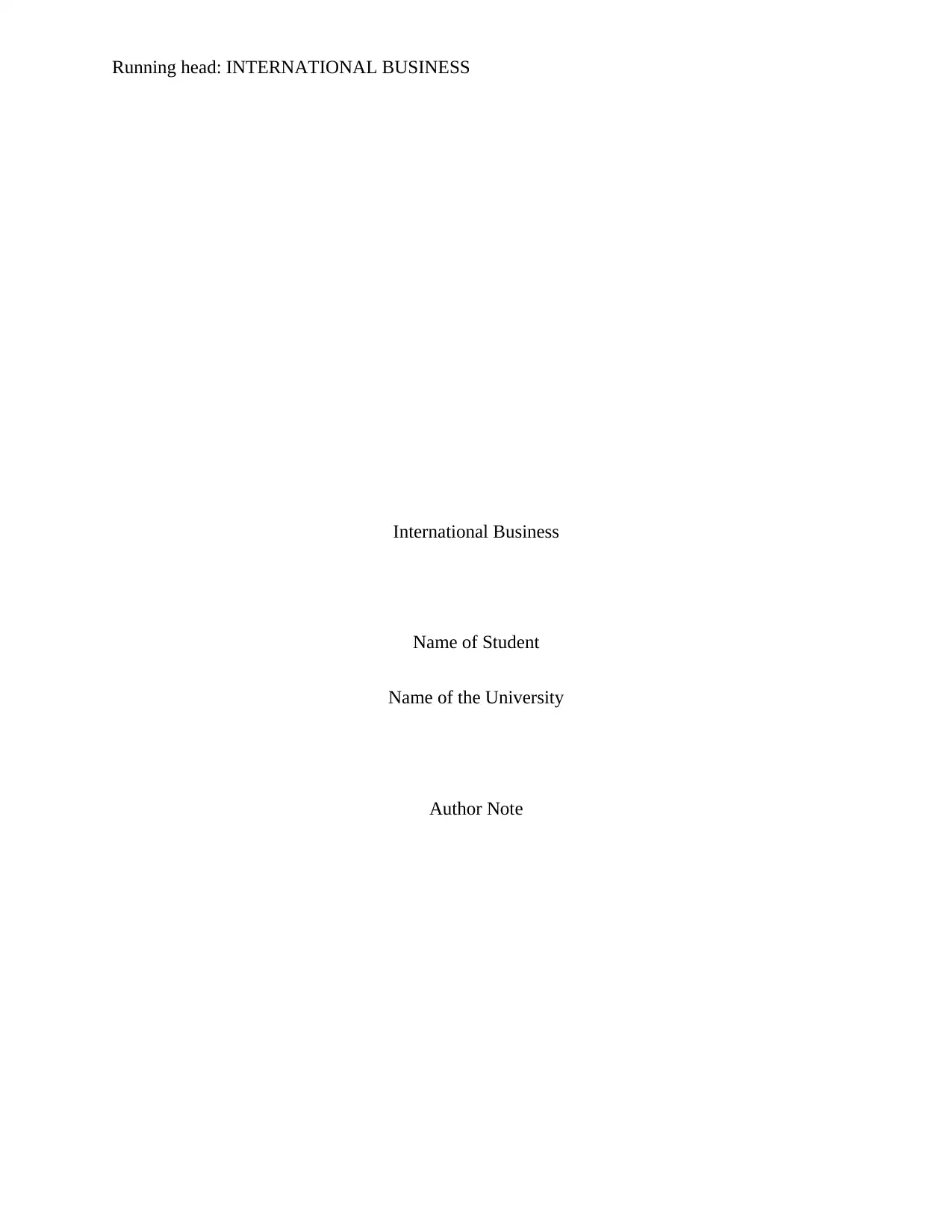
Running head: INTERNATIONAL BUSINESS
International Business
Name of Student
Name of the University
Author Note
International Business
Name of Student
Name of the University
Author Note
Paraphrase This Document
Need a fresh take? Get an instant paraphrase of this document with our AI Paraphraser
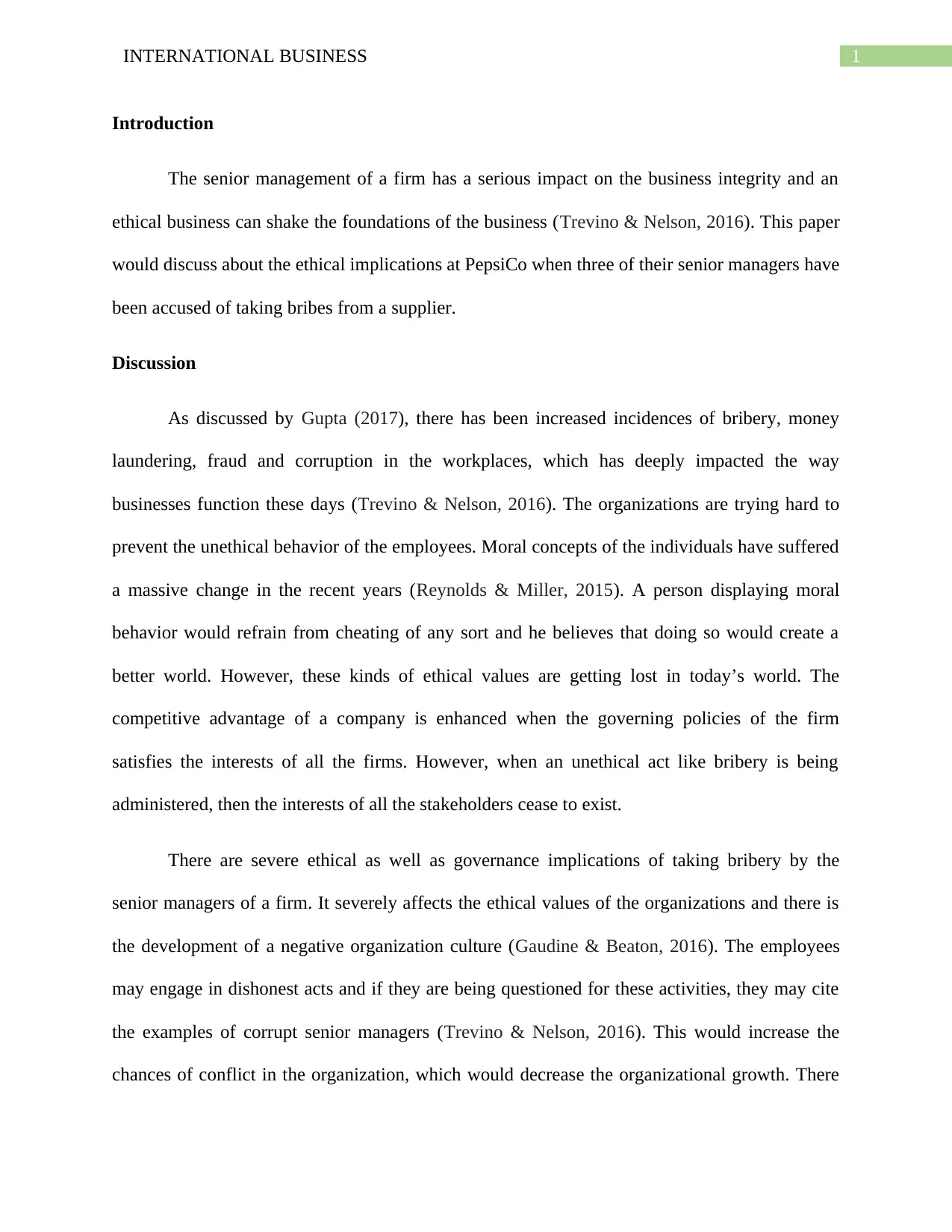
1INTERNATIONAL BUSINESS
Introduction
The senior management of a firm has a serious impact on the business integrity and an
ethical business can shake the foundations of the business (Trevino & Nelson, 2016). This paper
would discuss about the ethical implications at PepsiCo when three of their senior managers have
been accused of taking bribes from a supplier.
Discussion
As discussed by Gupta (2017), there has been increased incidences of bribery, money
laundering, fraud and corruption in the workplaces, which has deeply impacted the way
businesses function these days (Trevino & Nelson, 2016). The organizations are trying hard to
prevent the unethical behavior of the employees. Moral concepts of the individuals have suffered
a massive change in the recent years (Reynolds & Miller, 2015). A person displaying moral
behavior would refrain from cheating of any sort and he believes that doing so would create a
better world. However, these kinds of ethical values are getting lost in today’s world. The
competitive advantage of a company is enhanced when the governing policies of the firm
satisfies the interests of all the firms. However, when an unethical act like bribery is being
administered, then the interests of all the stakeholders cease to exist.
There are severe ethical as well as governance implications of taking bribery by the
senior managers of a firm. It severely affects the ethical values of the organizations and there is
the development of a negative organization culture (Gaudine & Beaton, 2016). The employees
may engage in dishonest acts and if they are being questioned for these activities, they may cite
the examples of corrupt senior managers (Trevino & Nelson, 2016). This would increase the
chances of conflict in the organization, which would decrease the organizational growth. There
Introduction
The senior management of a firm has a serious impact on the business integrity and an
ethical business can shake the foundations of the business (Trevino & Nelson, 2016). This paper
would discuss about the ethical implications at PepsiCo when three of their senior managers have
been accused of taking bribes from a supplier.
Discussion
As discussed by Gupta (2017), there has been increased incidences of bribery, money
laundering, fraud and corruption in the workplaces, which has deeply impacted the way
businesses function these days (Trevino & Nelson, 2016). The organizations are trying hard to
prevent the unethical behavior of the employees. Moral concepts of the individuals have suffered
a massive change in the recent years (Reynolds & Miller, 2015). A person displaying moral
behavior would refrain from cheating of any sort and he believes that doing so would create a
better world. However, these kinds of ethical values are getting lost in today’s world. The
competitive advantage of a company is enhanced when the governing policies of the firm
satisfies the interests of all the firms. However, when an unethical act like bribery is being
administered, then the interests of all the stakeholders cease to exist.
There are severe ethical as well as governance implications of taking bribery by the
senior managers of a firm. It severely affects the ethical values of the organizations and there is
the development of a negative organization culture (Gaudine & Beaton, 2016). The employees
may engage in dishonest acts and if they are being questioned for these activities, they may cite
the examples of corrupt senior managers (Trevino & Nelson, 2016). This would increase the
chances of conflict in the organization, which would decrease the organizational growth. There
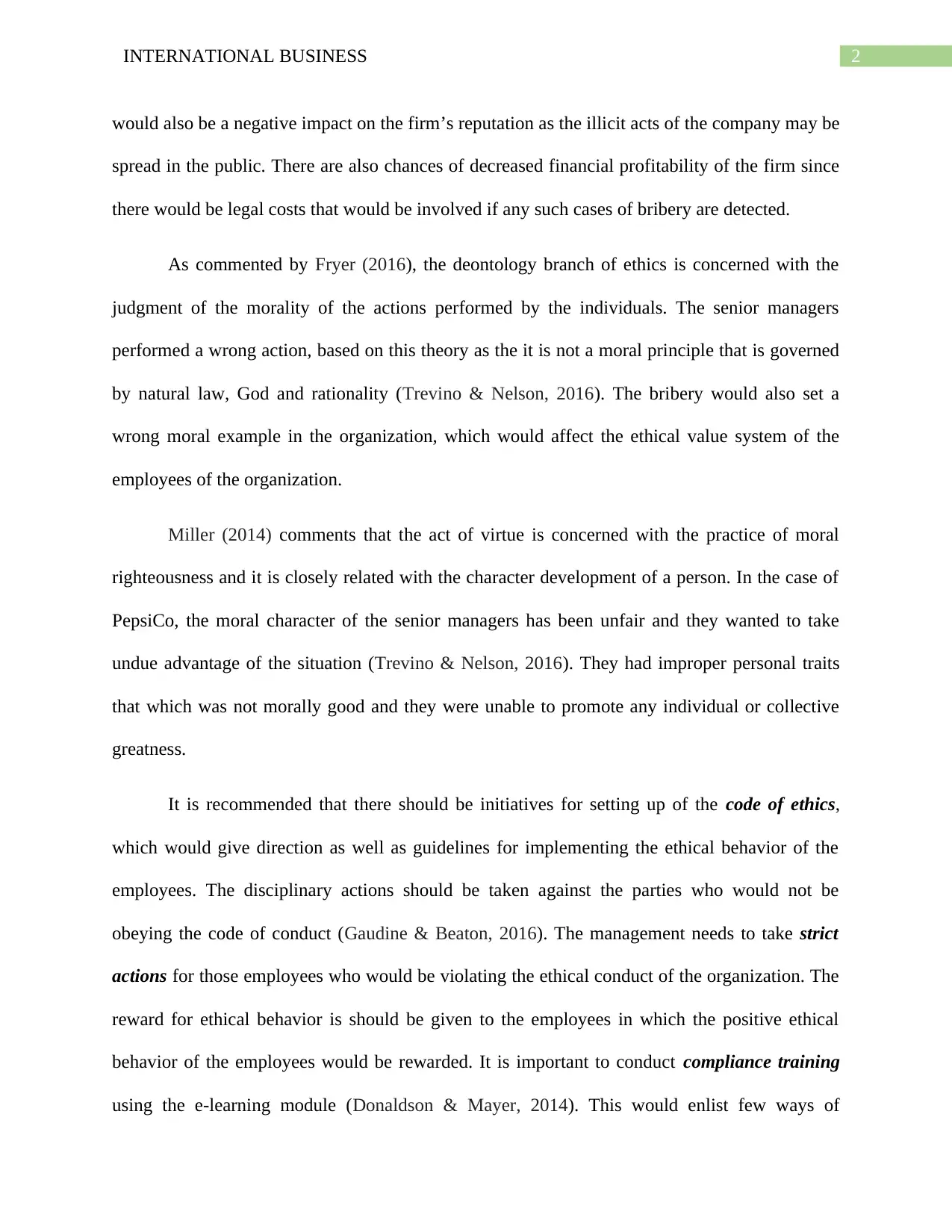
2INTERNATIONAL BUSINESS
would also be a negative impact on the firm’s reputation as the illicit acts of the company may be
spread in the public. There are also chances of decreased financial profitability of the firm since
there would be legal costs that would be involved if any such cases of bribery are detected.
As commented by Fryer (2016), the deontology branch of ethics is concerned with the
judgment of the morality of the actions performed by the individuals. The senior managers
performed a wrong action, based on this theory as the it is not a moral principle that is governed
by natural law, God and rationality (Trevino & Nelson, 2016). The bribery would also set a
wrong moral example in the organization, which would affect the ethical value system of the
employees of the organization.
Miller (2014) comments that the act of virtue is concerned with the practice of moral
righteousness and it is closely related with the character development of a person. In the case of
PepsiCo, the moral character of the senior managers has been unfair and they wanted to take
undue advantage of the situation (Trevino & Nelson, 2016). They had improper personal traits
that which was not morally good and they were unable to promote any individual or collective
greatness.
It is recommended that there should be initiatives for setting up of the code of ethics,
which would give direction as well as guidelines for implementing the ethical behavior of the
employees. The disciplinary actions should be taken against the parties who would not be
obeying the code of conduct (Gaudine & Beaton, 2016). The management needs to take strict
actions for those employees who would be violating the ethical conduct of the organization. The
reward for ethical behavior is should be given to the employees in which the positive ethical
behavior of the employees would be rewarded. It is important to conduct compliance training
using the e-learning module (Donaldson & Mayer, 2014). This would enlist few ways of
would also be a negative impact on the firm’s reputation as the illicit acts of the company may be
spread in the public. There are also chances of decreased financial profitability of the firm since
there would be legal costs that would be involved if any such cases of bribery are detected.
As commented by Fryer (2016), the deontology branch of ethics is concerned with the
judgment of the morality of the actions performed by the individuals. The senior managers
performed a wrong action, based on this theory as the it is not a moral principle that is governed
by natural law, God and rationality (Trevino & Nelson, 2016). The bribery would also set a
wrong moral example in the organization, which would affect the ethical value system of the
employees of the organization.
Miller (2014) comments that the act of virtue is concerned with the practice of moral
righteousness and it is closely related with the character development of a person. In the case of
PepsiCo, the moral character of the senior managers has been unfair and they wanted to take
undue advantage of the situation (Trevino & Nelson, 2016). They had improper personal traits
that which was not morally good and they were unable to promote any individual or collective
greatness.
It is recommended that there should be initiatives for setting up of the code of ethics,
which would give direction as well as guidelines for implementing the ethical behavior of the
employees. The disciplinary actions should be taken against the parties who would not be
obeying the code of conduct (Gaudine & Beaton, 2016). The management needs to take strict
actions for those employees who would be violating the ethical conduct of the organization. The
reward for ethical behavior is should be given to the employees in which the positive ethical
behavior of the employees would be rewarded. It is important to conduct compliance training
using the e-learning module (Donaldson & Mayer, 2014). This would enlist few ways of
⊘ This is a preview!⊘
Do you want full access?
Subscribe today to unlock all pages.

Trusted by 1+ million students worldwide
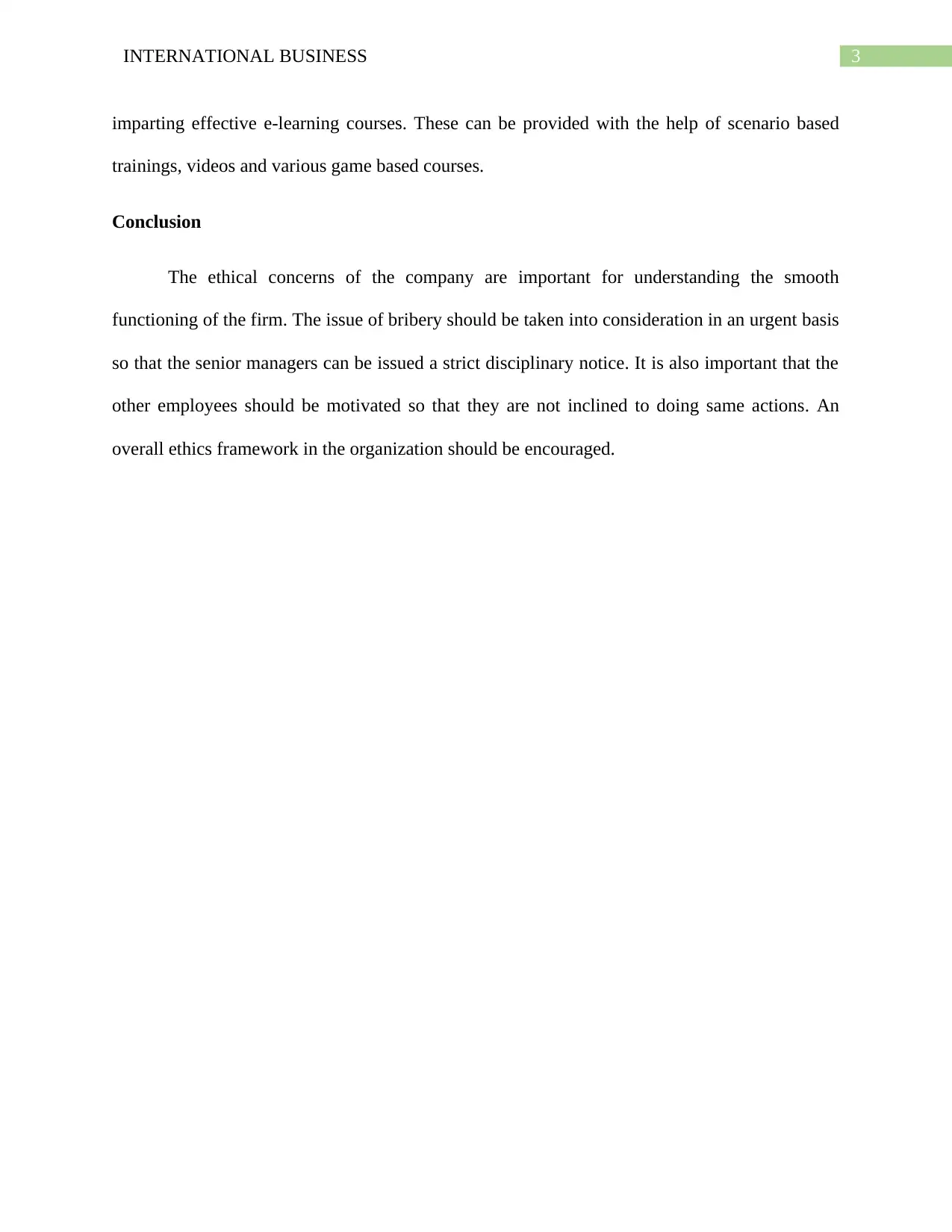
3INTERNATIONAL BUSINESS
imparting effective e-learning courses. These can be provided with the help of scenario based
trainings, videos and various game based courses.
Conclusion
The ethical concerns of the company are important for understanding the smooth
functioning of the firm. The issue of bribery should be taken into consideration in an urgent basis
so that the senior managers can be issued a strict disciplinary notice. It is also important that the
other employees should be motivated so that they are not inclined to doing same actions. An
overall ethics framework in the organization should be encouraged.
imparting effective e-learning courses. These can be provided with the help of scenario based
trainings, videos and various game based courses.
Conclusion
The ethical concerns of the company are important for understanding the smooth
functioning of the firm. The issue of bribery should be taken into consideration in an urgent basis
so that the senior managers can be issued a strict disciplinary notice. It is also important that the
other employees should be motivated so that they are not inclined to doing same actions. An
overall ethics framework in the organization should be encouraged.
Paraphrase This Document
Need a fresh take? Get an instant paraphrase of this document with our AI Paraphraser
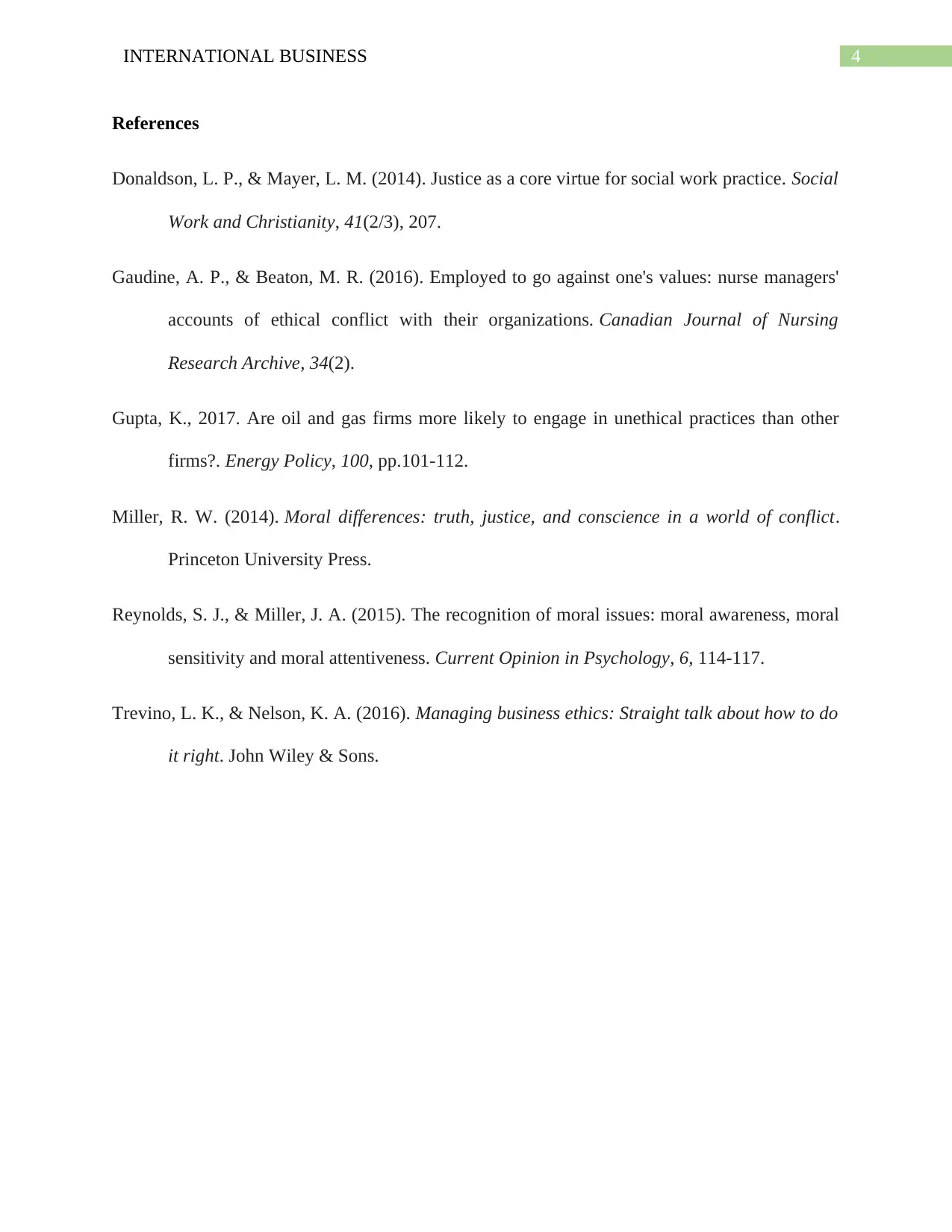
4INTERNATIONAL BUSINESS
References
Donaldson, L. P., & Mayer, L. M. (2014). Justice as a core virtue for social work practice. Social
Work and Christianity, 41(2/3), 207.
Gaudine, A. P., & Beaton, M. R. (2016). Employed to go against one's values: nurse managers'
accounts of ethical conflict with their organizations. Canadian Journal of Nursing
Research Archive, 34(2).
Gupta, K., 2017. Are oil and gas firms more likely to engage in unethical practices than other
firms?. Energy Policy, 100, pp.101-112.
Miller, R. W. (2014). Moral differences: truth, justice, and conscience in a world of conflict.
Princeton University Press.
Reynolds, S. J., & Miller, J. A. (2015). The recognition of moral issues: moral awareness, moral
sensitivity and moral attentiveness. Current Opinion in Psychology, 6, 114-117.
Trevino, L. K., & Nelson, K. A. (2016). Managing business ethics: Straight talk about how to do
it right. John Wiley & Sons.
References
Donaldson, L. P., & Mayer, L. M. (2014). Justice as a core virtue for social work practice. Social
Work and Christianity, 41(2/3), 207.
Gaudine, A. P., & Beaton, M. R. (2016). Employed to go against one's values: nurse managers'
accounts of ethical conflict with their organizations. Canadian Journal of Nursing
Research Archive, 34(2).
Gupta, K., 2017. Are oil and gas firms more likely to engage in unethical practices than other
firms?. Energy Policy, 100, pp.101-112.
Miller, R. W. (2014). Moral differences: truth, justice, and conscience in a world of conflict.
Princeton University Press.
Reynolds, S. J., & Miller, J. A. (2015). The recognition of moral issues: moral awareness, moral
sensitivity and moral attentiveness. Current Opinion in Psychology, 6, 114-117.
Trevino, L. K., & Nelson, K. A. (2016). Managing business ethics: Straight talk about how to do
it right. John Wiley & Sons.
1 out of 5
Related Documents
Your All-in-One AI-Powered Toolkit for Academic Success.
+13062052269
info@desklib.com
Available 24*7 on WhatsApp / Email
![[object Object]](/_next/static/media/star-bottom.7253800d.svg)
Unlock your academic potential
Copyright © 2020–2026 A2Z Services. All Rights Reserved. Developed and managed by ZUCOL.




